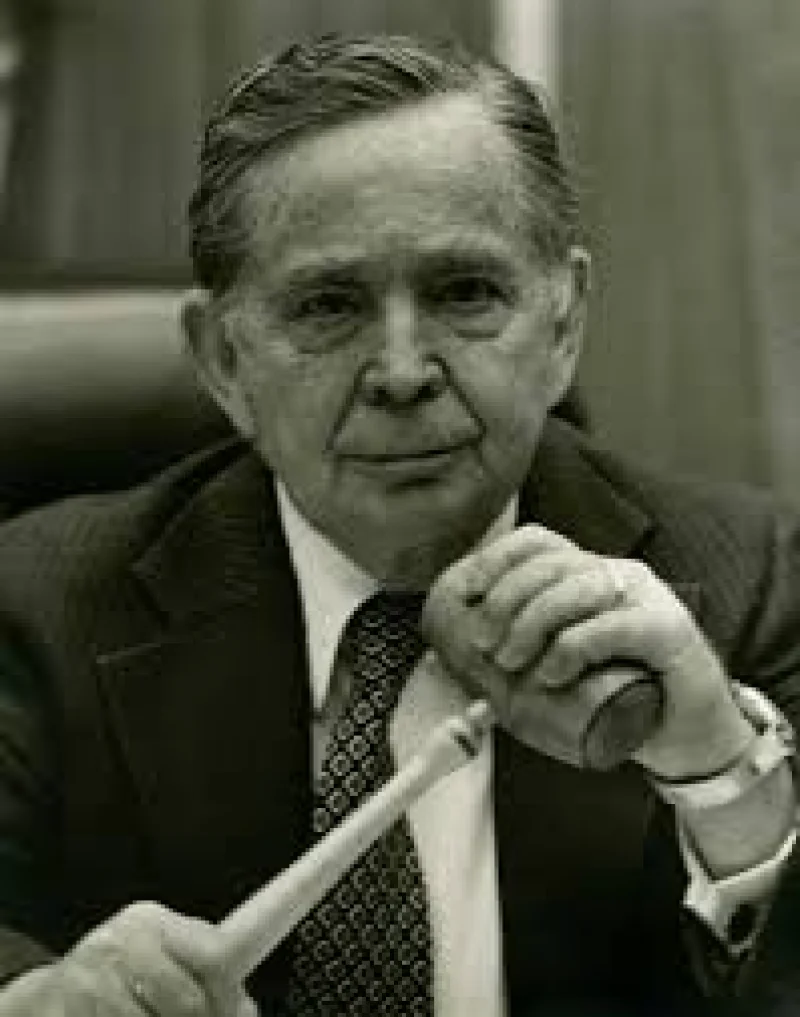Short Summary
Carl Albert was a prominent American politician who served as the 46th Speaker of the United States House of Representatives from 1971 to 1977. Known as the "Little Giant from Little Dixie," he played a significant role in navigating the legislative landscape during a turbulent period in U.S. history. His leadership was marked by significant legislative achievements and efforts to maintain order during the Watergate scandal. Albert's legacy is characterized by his commitment to public service and his influence on American politics.
Early Life & Education
Carl Albert was born on May 10, 1908, in McAlester, Oklahoma, into a modest coal-mining family. Despite financial hardships, he excelled academically, showing an early aptitude for leadership and debate. He attended the University of Oklahoma, where he became a member of the Phi Beta Kappa society and graduated with a degree in political science. Albert then earned a Rhodes Scholarship to study at the University of Oxford, furthering his education in law and government. His early experiences and education laid the foundation for his future political career, instilling in him a dedication to public service and civic duty.
Career Highlights
Albert's political career began in earnest with his election to the U.S. House of Representatives in 1946, representing Oklahoma's 3rd congressional district. He quickly rose through the ranks, serving as Majority Whip and later as Majority Leader before becoming Speaker of the House in 1971. As Speaker, Albert was instrumental in passing key legislation, including the War Powers Act and efforts to reform congressional procedures. His tenure was marked by the challenge of maintaining legislative progress amid the Vietnam War and the Watergate scandal, during which he played a crucial role in the succession process following President Nixon's resignation.
Major Achievements
- Guided significant legislation such as the War Powers Act, reshaping U.S. military engagement policies.
- Played a pivotal role in the orderly transition of power during the Watergate scandal.
- Served as Speaker of the House during a period of substantial social and political change in the United States.
- Contributed to the passage of civil rights legislation and social welfare programs.
Famous Quotes
- "The House is the people's house. The people should do the governing."
- "It takes more than a majority to govern; it takes a sense of justice and wisdom."
Interesting Facts
- Albert was known as the "Little Giant from Little Dixie" due to his small stature and influential political role.
- He was a Rhodes Scholar, a prestigious academic achievement that took him to the University of Oxford.
- Albert was an accomplished debater, winning a national championship in collegiate debate.
- He was deeply involved in the legislative response to President Nixon's resignation, ensuring a smooth transition of power.
- Albert retired from politics in 1977 and returned to Oklahoma, where he became a respected elder statesman.
Legacy / Influence
Carl Albert's legacy is defined by his dedication to the legislative process and his ability to steer the House through challenging times. His leadership during the Watergate crisis and his commitment to civil rights and social welfare legislation left a lasting impact on American governance. Albert's influence is remembered through his efforts to balance party interests with national priorities, fostering a legacy of integrity and bipartisanship in U.S. politics.
FAQ
Q: Why is Carl Albert famous?
A: He is famous for serving as the Speaker of the U.S. House of Representatives and for his pivotal role during the Watergate scandal.
Q: What was Carl Albert's educational background?
A: He studied at the University of Oklahoma and was a Rhodes Scholar at the University of Oxford.
Q: What are some key legislations associated with Carl Albert?
A: He was involved in the passage of the War Powers Act and various civil rights legislation.
Q: When did Carl Albert retire from politics?
A: He retired in 1977, following a distinguished career in public service.













